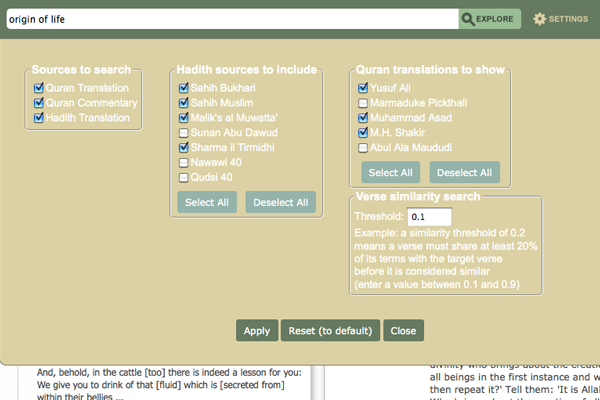EXPLORE, REFLECT, ACT.
The Holy Qur’an, for Muslims, is the principal source of guidance for every aspect of life, i.e. a Muslim’s code of ethics and conduct must ultimately have roots in the Qur’an.
But finding Qur’anic verses, relevant to a situation one may face, is a challenging task. The words we use to describe the situation may not be the exact words the Qur’an and its various translations use. Furthermore, relevant verses may speak of the matter in more general terms, or in more specific parables.
exploringthequran.com hopes to make this task easier, enabling you to find relevant verses, whatever words you start with.
First, synonyms of the words you start with are in effect included in the search, which is made over multiple translations. This increases the chances of finding verses containing words that have the same meaning as the words you start with.
Following that, you can choose to extend the search to words of broader (more general), narrower (more specific), or similar meanings. For example, broadening search on ‘money’ will find verses containing ‘wealth’, narrowing search on ‘mercy’ will find verses containing ‘pardon’, ‘reprieve’, ‘respite’, etc., and a similar search on ‘proud’ will find verses containing ‘arrogant’, ‘conceited’, ‘haughty’, etc.
Further, you can choose to extend search on the extended searches themselves. For example, having broadened the search on ‘money’ to find verses containing ‘wealth’, further broadening ‘wealth’ can find verses containing ‘belonging’, ‘holding’ or ‘property’.
In addition to the above types of exploration, you can also choose, for any verse found, to look for verses similar to it, i.e. containing meanings in common with it.
Finally, exploringthequran.com will also support exploring renowned collections of Hadiths, an important secondary source of guidance for Muslims, allowing you to see side by side Qur’anic verses and Hadiths relevant to the issue at hand.
Inshaa Allah, we hope you will find this a useful learning, reference and discovery tool, and especially, one that will help you research, by referring to the words of Allah SWT and the Sunnah of his Prophet SAW, the veracity or otherwise of any claim of an Islamic position on any issue by any party.
Find Quran Translations, Hadiths & Commentaries from many Sources
You may choose to view the texts from all or some (Qur’anic Translators: 1) Muhammad Asad 2) Abul Ala Maududi 3) Marmaduke Pickhall 4) M.H. Shakir 5) Yusuf Ali).
You may also view the Hadiths from all or some (Hadith Sources: 1) Sahih Bukhari 2) Sahih Muslimi 3) Malik’s al Muwatta’ 4) Sunan Abu Dawud 5) Sharma il Tirmidhi 6) Nawawi 40 7) Qudsi 40).
Comparing multiple sources is recommended as this can help you gain a better understanding of the message.
Explore using a Term or Phrase
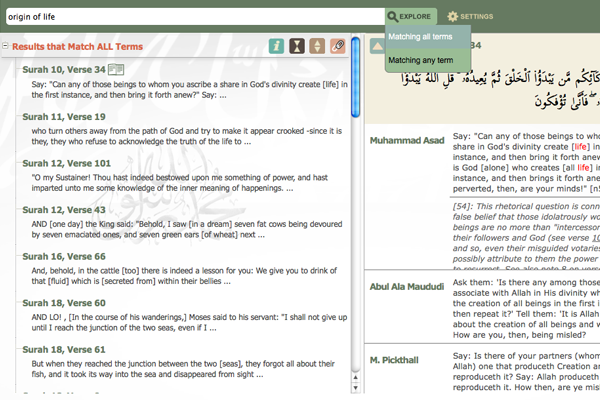
You may explore a particular word or term. Or you may type multiple words (a phrase or a sentence) to explore verses containing any combination of the words.
However, only significant words will be explored. Insignificant stop words such as a, an, and, but, the, which, where, if, etc. will be ignored.
Automatically get Word Synonyms
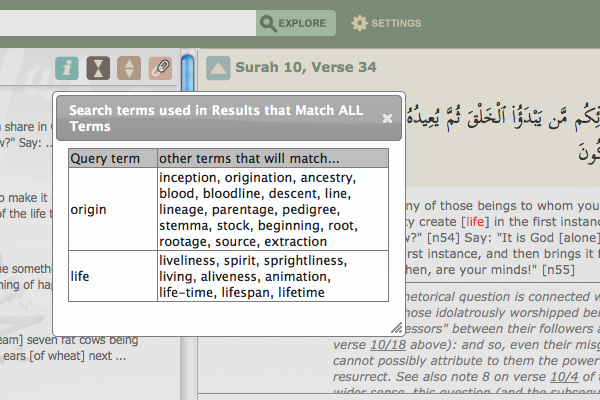
When you give a word to search on, texts containing its synonyms will also be found – further increasing the likelihood of finding texts relevant to your exploration. Other words having the same sense-meaning. Eg. searching for eternal can also find texts containing everlasting, perpetual, etc.
Our search method leverages on WordNet’s synsets* to include synonyms.
The use of WordNet currently restricts searchable translations to English. In principle, if an extensive WordNet-like lexical database exists for some language other than English, then search/exploration of translation texts in that language can be supported too.
(*WordNet groups words into sets called synsets, each with a distinct sense-meaning).
Browse Easily through the Verses
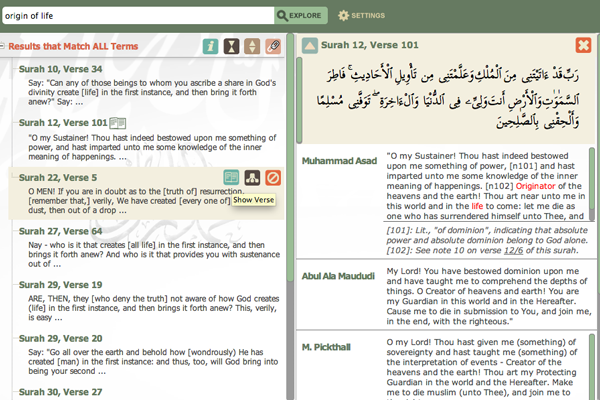
The top verses/hadith texts that best match your query are presented as a scrollable list.
You can easily browse through this list to display the corresponding full translations and hadiths.
Readily Explore Related Concepts
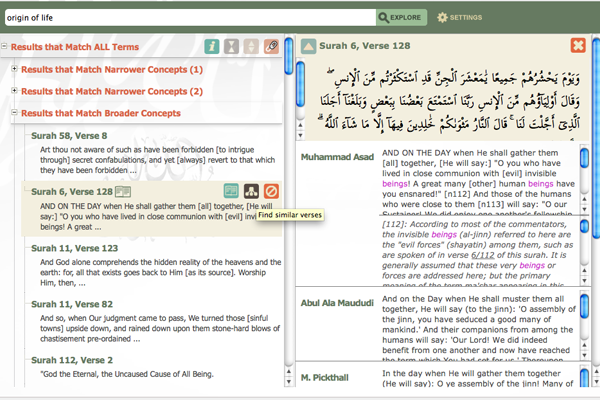
A novel exploration mode, leveraging on WordNet‘s conceptual-semantic relations, is also available. This allows you to explore additional texts, if any, that match concepts related to your search terms via selected conceptual-semantic relations.
Presently, the conceptual-semantic relations that leads to broader, narrower and similar meanings are used in exploring related texts. For example, exploring broader concepts of ‘money’ finds text that contains ‘wealth’.
You may also look for other verses that are similar to any verse shown in the results list. The degree of similarity between two verse texts is proportional to the number of synsets they share. You can specify a similarity threshold (under Settings) to limit verses returned through this type of exploration.


